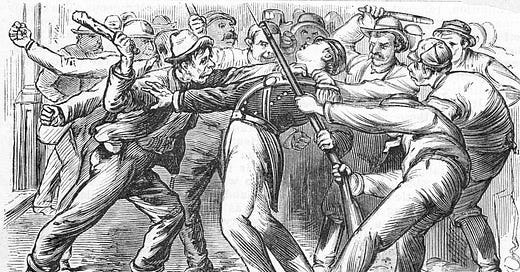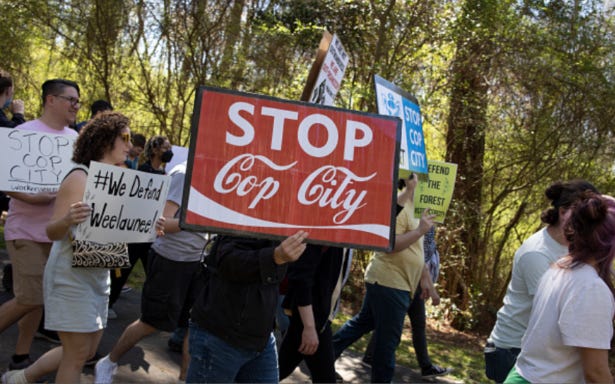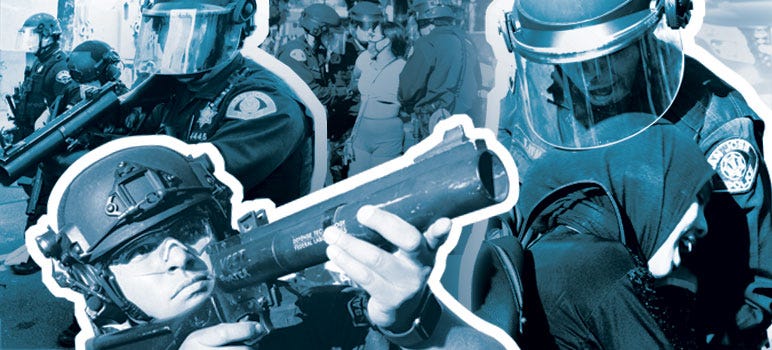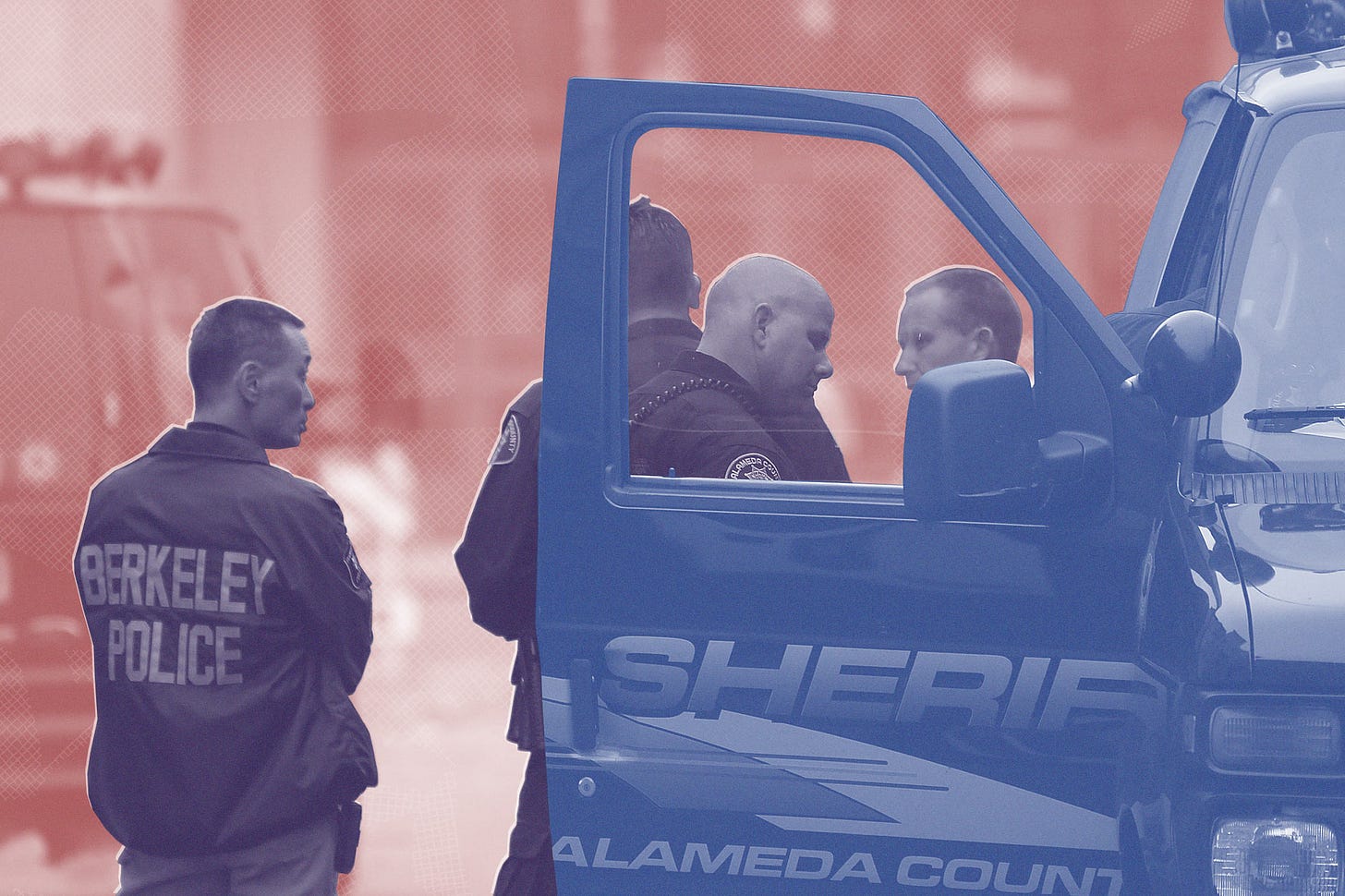Cop Mother Fucking Cities . . . Thanks to the IDF/IOF, Israel, ex-pigs, and other murdering assundry Fuckers
pig by any other name is "armed to kill" -- not to serve, not to be held accountable, none of that sissy stuff in AmeriKKKa
We are all Gazans, locked and loaded AmeriKKKan policing.
In 1877 the United States was rocked by one of the biggest strikes it had ever seen. That year, across the country but primarily on the East Coast and in Chicago, 100,000 railroad workers walked off the job. To suppress the strike, state and federal governments deployed the national guard and state militias in several states, resulting in at least a hundred deaths as troops fired on or injured strikers. The event became known as the Great Railroad Strike of 1877.
In an effort to create a secure urban environment in which residents can work, live, and prosper with minimal disruption, New York and London established a network of laws, policing, and municipal government in the nineteenth century aimed at building the confidence of the citizenry and creating stability for economic growth. At the same time, these two world cities attempted to maintain an expansive level of free speech and assembly, concepts deeply ingrained in both national cultures. As democracy expanded in tandem with the size of the cities themselves, the two goals clashed, resulting in tensions over their compatibility.
The results of this clash continue to resonate in our society today. Treating nineteenth-century London and New York as case studies, Lisa Keller examines the critical development of sanctioned free speech, controlled public assembly, new urban regulations, and the quelling of riots, all in the name of a proper regard for order. Drawing on rich archival sources that include the unpublished correspondence of government officials and ordinary citizens, Keller paints an intimate portrait of daily life in these two cities and the intricacies of their emerging bureaucracies. She finds that New York eventually settled on a policy of preempting disruption before it occurred, while London chose a path of greater tolerance toward street activities.
Dividing her history into five categories
cities, police and militia, the public, free speech and assembly, and the law
Keller concludes with an assessment of freedom in these cities today and asks whether the scales have been tipped too strongly on the side of order and control. Public officials increasingly use permits, fees, and bureaucratic hassles to frustrate the ability of reformers and protesters to make their voices heard, and by doing so, she argues, they strike at the very foundations of democracy.
In spring 2021, Keisha Lance Bottoms, then mayor of Atlanta, announced a plan to create a 150-acre police training center in the city. It would be situated in southeast Atlanta, in a large, forested area often referred to as the city’s “lungs.” Dave Wilkinson, president of the Atlanta Police Foundation, the semi-private fundraising arm of the city’s police department, boasted that the training center would be “a beacon for what we call 21st century policing.” (That the Atlanta Police Foundation is semi-private should come as no surprise. In the nineteenth century, after all, it was not uncommon for private groups to fundraise for new armory projects.) The announcement kicked off three years of chaos, as a wide coalition of protesters—including criminal justice reformers, abolitionists, and environmentalists—sought to prevent the construction of what was quickly dubbed Cop City.
These fucking white racists. Shhoootttt to kill? Seems easy, now, that U$A is armed. Shhooottt pigs on sight?
Here we go:
Some of the company’s policies, including the use-of-force policy challenged by Jackson’s family, depart in significant ways from recommendations by mainstream policing organizations. The National Consensus Policy on Use of Force, a collaboration between 11 major law enforcement groups, requires cops to try deescalation techniques before using force if possible. Lexipol discourages police departments from requiring them.
Bruce Praet is a well-known name in law enforcement, especially across California. He co-founded a company called Lexipol that contracts with more than 95% of police departments in the state and offers its clients trainings and ready-made policies.
In one of Praet’s training webinars, posted online, he offers a piece of advice that policing experts have called inhumane. It’s aimed at protecting officers and their departments from lawsuits.
After police kill someone, they are supposed to notify the family. Praet advises officers to use that interaction as an opportunity. Instead of delivering the news of the death immediately, he suggests first asking about the person who was killed to get as much information as possible.
Reporter Brian Howey found that officers have been using this tactic across California, and the information families disclosed before they knew their relative was killed affected their lawsuits later.
The push by Atlanta and other cities to build large police training facilities follows on a long history of armories as both symbols and manifestations of the state’s power. By Matthew Guariglia
It doesn’t stop with Atlanta. A number of other major cities have subsequently opened or proposed their own versions of Cop City.
In August 2023, Baltimore, a city which sparked its own large-scale protest movement following the Baltimore Police Department’s killing of Freddie Gray in 2015, got its own proposal for a $330 million police training center. This proposal didn’t include a forest, but instead proposed the center be housed on the grounds of Coppin State University, a public, historically Black university.
For its part, Chicago had been planning a large police training facility since 2017, and in January 2023 it opened, at a cost of $170 million (nearly double its projected cost of $95 million). At the ribbon cutting, Chicago’s then mayor, Lori Lightfoot, said to police, “Don’t let anyone ever tell you this city doesn’t have your back, we do each and every one of you.” Like other proposed centers, Chicago’s cop city has a massive simulation village to help train officers for various scenarios.
Then, on March 21, 2024, New York City mayor Eric Adams announced that the city would be building its own $225 million police training center in Queens. The announcement came just weeks after New York Police Department officers—in full tactical gear and accompanied by an armored vehicle—raided a Columbia University building occupied by students protesting Israel’s war on Gaza.
The United States was a nation of armories, then a nation of bases—now it is becoming a nation of cop cities. These projects are the latest physical and architectural manifestations of the state’s impulse to stockpile weapons, warriors, and urban space itself in order to suppress opposition and righteous disorder. And, contrary to the narrative of the Atlanta police, their genesis is not just a reaction to crime spikes or low officer morale, but an explicit threat about how ready and well equipped local police will be the next time a large-scale protest movement emerges.
A Fucking Trump and Emoff-Harris wet dream!
Ahh, true, from pigs in blue uniforms to pigs in khaki —
“Constantly voting for the so-called lesser of two evils just paves the way for the greater evil.”
As of 2023, the United States had 750 military bases across the world, or “75 to 85 percent of the world’s total overseas military bases.” Many of those were in allied friendly countries, but others were in conflict zones or contested terrain. The bases signal “not only the capability but, more importantly, the political will to fight in ways long range systems cannot.” It’s a philosophy that has led some writers, notably David Vine, to refer to the United States, with its global military influence, as a “base nation.”
It’s a really heavy choice — every choice is loss. It is so deeply dehumanizing to have to ignore a genocide and complicity in it, and a promise to continue the same policy, which is what Vice President Harris has said. At the end of the day, we’re being presented with a little bit of a false choice: If people can be protesting on this scale, and we don’t have an option that can align with that, and you can suppress anti-genocide voters in that calculus, I don’t know what kind of democracy you’re protecting. And that’s really heavy. My sister is trying to fill in her ballot, and she’s like, “I feel physically nauseous.” That’s real. If I see a shredded child on my timeline again, I don’t know what I’m expected to do, like, vote for that?
I’m Palestinian and my husband is Lebanese, and our family is not from Gaza, but I have very close friends who’ve lost their family and their childhood homes and their neighborhoods. And my husband’s neighborhood in Lebanon has also been virtually, completely leveled.
Folks are committed, as far as I can tell, to voting third-party, or leaving it blank, or writing something in. And then there are other folks that, on a day-to-day basis, they’re reluctant Harris voters or they flip-flop between that and deciding they’re not going to do it — they’re going to vote third-party or something of that sort. The picture that I’m getting is that voters are pretty committed to this idea that they want to vote against genocide. — The Anguished Undecided, Halah Ahmad, Wisconsin, political strategist and organizer with Listen to Wisconsin
+—+
That trump-pelosi-nuland-kagan-blinken-yellen-emoff-harris Final Solution War with China.
Too big to fail? Intel Posts $16.6 Billion Quarterly Loss, Its Biggest Ever! And so we bend over for Raytheon, Dirty Israel, Dirty New Little Wannabe Israel/Ukraine, and this shit — bailing out chip makers???
American lawmakers have quietly been discussing options on how they could help Intel get back on its feet should its financial situation deteriorate. According to a Semafor report, sources say this possible rescue package will be above and beyond the scope of the CHIPS Act, which would award the company at least $8.5 billion before the end of 2024.
It should be noted, though, that these are just precautionary discussions of backup plans in case the company folds. After all, the company had reported a strong outlook on its third quarterly earnings call for 2024.
These discussions show how much Washington, D.C. values Intel, primarily as the U.S. competes with China for global dominance in advanced technologies. Although both AMD and Nvidia, semiconductor giants in their rights, are also American companies, Intel is the only one that both designs and manufactures chips. “Intel is the only American company that designs and manufactures leading-edge chips and is playing a critical role in enabling a globally competitive semiconductor ecosystem in the U.S.,” said an Intel spokesperson to Semafor.
Intel employees face 'setbacks' as the company slashes staff, pay, and perks

Mud? Molotovs. Anger and frustration erupted in Spain on Sunday as King Felipe VI arrived in the town of Paiporta to survey the damage from historic flash floods that killed more than 200 people on Tuesday night.
In a chaotic scene, mud, objects and insults were flung at the king as his entourage attempted to hold back a crowd yelling “Murderers, murderers!” and “Get out!”

Here we go again with that fucking bad science. So, depression, multiple emotional levels, all the mental strain, fog, autism, schizophrenia, bi-polar, ADHD, ODD, whatever, all of that, including suicides, all marked up to the DNA? Which DNA, and which mutations and when, and why and how?
Researchers at Stanford Medicine have developed an AI-based method to identify complex structural variants in the human genome, revealing insights into genetic factors influencing psychiatric disorders like schizophrenia and bipolar disorder.
+—+
Right. Cop City, Base World, Century of the Corrupting-Colluding-Criminal-Crazy Jew, nah, none of that has any effect on brains.
Multiple police departments that have been sued over Lexipol-authored policies have turned to Praet to defend them. “It’s sort of a form of double dipping,” Takei, the ACLU attorney, says. “The local government is paying for a Lexipol policy that’s marketed on the premise that it would prevent lawsuits—and is paying again when officers kill people, and then their family sues the local government.”
“One private company…has the power to rewrite the use-of-force standards for America’s largest state, and that’s just unacceptable.”
This story was co-published with Citylab.
Gabriel Gomez Maciel was driving to church in Spokane, Washington, in 2014, when a minivan T-boned his pickup truck. The minivan driver apologized to Gomez, called police, and told the responding officer that he was at fault. But when the officer arrived, she detained Gomez while she contacted U.S. Border Patrol to ask about his immigration status.
According to a lawsuit filed by the Northwest Immigrant Rights Project and the American Civil Liberties Union of Washington, the officer kept Gomez there for nearly 90 minutes before Border Patrol agents arrived. Gomez had committed no crime and had no criminal history, and the officer didn’t ask him any questions about his immigration status, according to the suit. Still, he was taken into Border Patrol custody and jailed for a month.
City officials said Gomez’s detention was permitted under Spokane Police Department policy, which said, “officers may detain foreign nationals solely for alleged undocumented presence in the U.S. if the U.S. Immigration and Customs Enforcement (ICE) is contacted and can respond to take custody within a reasonable time.” The ACLU argued that the policy violated the Fourth Amendment’s protections from unreasonable search and seizure and the Washington state constitution. Last year, Spokane reached a settlement with Gomez and agreed to change its policies.
But identical language remains in place at law enforcement agencies across the country.
The policy was written by Lexipol, a California-based company that says it provides policies for approximately 3,400 police, fire, and correctional agencies in 35 states. It has grown rapidly over the last 15 years and saturated California, where its clients include more than 90 percent of law enforcement agencies. It’s impossible to know just how far Lexipol’s reach has spread as the company declines to provide a list of clients, saying that it is proprietary information. But according to an analysis published last year in the Texas Law Review, “although there are other private, nonprofit, and government entities that draft police policies, Lexipol is now a dominant force in police policymaking across the country.”
As a result, a large portion of American police policy is now being drafted by a little-known private company with no public oversight.
The company has warned against changes meant to reduce excessive force and hold officers accountable.
The company, which now has more than 200 employees, was founded in 2003 by Bruce Praet and Gordon Graham, two former law enforcement officers who later became attorneys, and businessman Dan Merkle. Before founding Lexipol, Praet was an attorney for the Los Angeles police union and the Orange city attorney’s office, where he handled police litigation.
In an interview, Praet rejected the ACLU’s allegations that Lexipol’s immigration policies were ever unconstitutional or illegal.
Lexipol advertises itself as a time-saver. Instead of drafting and adapting their own policies, departments can simply outsource the job to Lexipol, which pledges to protect agencies from lawsuits by keeping them up to date with the latest court decisions and legislation. To some city officials who rely on the policies, the appeal of the service is the updates and industry best practices it pledges to provide. The company’s terms and conditions specify that Lexipol is not liable for its policies, leaving its clients responsible if the policies are challenged in court, like in Spokane.
But a risk management approach doesn’t always square with better policing. In fact, Lexipol’s focus on vaguer, more flexible policies can shield officers from accountability and hinder reform, legal experts say.




















“When I was seven, I learned a lesson from cube and ee-zee-eee,
What was it again???
Ohhh yeah,
FUCK THE POLICE”
One of the pigs who murdered Breanna Taylor is finally “facing” life in prison for killing her.
I guess we’ll see what “facing” actually amounts to.